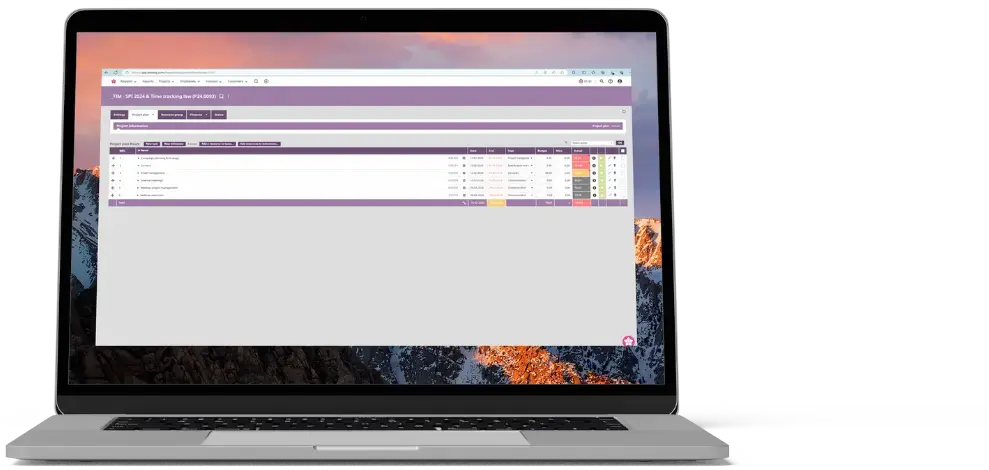Project Management 101: Understanding the Project Lifecycle
6 min read
Time tracking
Build your perfect data foundation for spotless invoicing and deep business insights with easy time tracking.
Project management
Be a world champion project manager. Keep your projects on track - and profitable.
Resource management
Efficiently staff projects and run a predictable business with confidence.
Insights & Reporting
Get smarter - faster - to make clever decisions for long-term growth impact.
Project accounting & Invoicing
Invoice everything - fast and accurate - while staying on top of project finances.
Staff & Salary
Give accountants and HR an intelligent tool to eliminate draining administration.
Financial Systems
TimeLog offers standard integrations for all your favourite financial systems. Save time and reduce manual tasks.
Payroll Solutions
TimeLog offers standard integrations for multiple payroll solutions. Get easy salary administration and only enter payroll information once.
Add-ons
Track time automatically via Outlook, use gamification or find another add-on that can support your business.
Multiple Legal Entities
You can create synergy between your departments and across borders and offices with the Multiple Legal Entities module from TimeLog.
Business Intelligence
Utilise the insights you get from TimeLog to the fullest. Our system is ready to integrate with multiple BI solutions.
Partner Integrations
TimeLog PSA is part of a large ecosystem. Get an overview of all the partner integrations in the TimeLog family.
Economy department
Save 1-2 days a month on your invoicing process.
Project teams
From planning to execution and evaluation. Robust tools for every project manager.
Management teams
Create a performance-driven culture with solid reporting capabilities.
Large enterprises
Enhance operations and performance across entities, countries and departments.
NGOs and non-profit organisations
Simplify internal processes, spend less time on administration, and get documentation in place - at a discounted rate.
Blog
Get inspired to run an even better business with articles, guides and analyses.
Guides, podcasts and webinars
Get access to templates, guides and webinars that help and inspire you.
Help Center
Looking for help material and user guides to the TimeLog system? Look no further. Find all the help you need now.
Get a single source of truth
Discover how companies maintain a single source of truth across borders, departments, and currencies.
Get integrated
Discover the advantages customers gain from utilising our integrations and API.
Reporting in real-time
Explore how others leverage reporting to optimise their processes and make informed decisions.
Get started with resource planning
Discover how other companies thoroughly grasp their resources and enhance their ability to predict future trends.
Improved project financials
This is how the efficient financial toolbox from TimeLog helps project managers and CFOs improve their project financials.
Faster invoicing
Discover how other companies have slashed the time spent on invoicing by 75% - and uncover how you can achieve the same efficiency.
The Story of TimeLog
Get insights on TimeLog and how we can help you grow and evolve your business.
Employees
See who shows up every day to deliver the best PSA solution.
Career
What's life like at TimeLog? Are we hiring? Get the answer here.
Partner
Create even more value for your customers, as well as ours, as a TimeLog Partner.
Premium Service
Online Help Center, tailored onboarding and support from Day 1.
Corporate Social Responsibility
We work to ensure a positive impact on planet, people and businesses.
Security and GDPR
Learn more about how we work to keep your data safe and provide maximum security.
6 min read
Managing project budgets is a crucial component of effective project management. It provides the foundation for keeping your project financially stable and on the right course.
However, project budgeting can be complex and challenging. It requires careful attention and strategic planning, from cost estimations to resource allocation, expense tracking, and necessary adjustments.
/AI-Generated%20Media/Images/project%20budgeting-1.jpeg)
Not to mention constant "budget transparency" and communication to stakeholders, handling budget approvals and revisions, and integrating budget management into your overall project management practices.
Sounds overwhelming? Don't worry. This guide is here to help you.
This guide is for project managers, business owners, financial analysts, and other professionals who plan and execute projects and want to improve their performance.
I'll walk you through the fundamentals of project budgeting, from creating a project budget from scratch to managing and analysing it effectively.
In this guide, you'll also get:
Ready to take your project budgeting skills to the next level?
Before we delve into the nitty-gritty of project budgeting, let's first understand what it is and why it's so important.
Project budgeting is a strategic process that involves planning, allocating, and controlling project costs.
But why is it so critical? Let's find out.
In short, project budgeting is the process of estimating the total cost of a project.
It involves identifying all possible expenses and allocating funds accordingly. It's about managing the costs throughout the project lifecycle.
This means tracking expenses, comparing them with the budget, and adjusting as needed.
In essence, project budgeting is a roadmap that guides your project's financial decisions.
First, it'll help you ensure that your project is financially feasible. Without a budget, you risk overspending, which can lead to financial losses.
Second, a project budget provides a financial framework for decision-making. It helps you prioritise tasks, allocate resources, and make trade-offs between different project elements. And as such it's a vital part of your project scoping.
Third, a well-planned budget can improve stakeholder confidence. It shows that you have a clear plan for managing the project's finances, reducing the risk of financial surprises.
Finally, project budgeting is essential for measuring project performance. By comparing actual costs with budgeted costs, you can identify areas of inefficiency and take corrective action.
A project budget typically includes several key components:
Understanding these components is the first step towards mastering project budgeting.
Creating a project budget is a continuous process that evolves with your project and typically involves five key steps:
The first step in the project budgeting process is defining your project scope.
This involves identifying all the tasks that must be completed to deliver the project. It also includes defining the project's objectives, deliverables, and timeline.
Having a clear project scope is crucial for accurate budgeting. It helps you understand what resources you'll need and what costs you can expect.
Once you've defined your project scope, the next step is to identify the necessary resources. These include everything from labour and materials to equipment and software. You'll need to determine the quantity and cost per unit for each resource.
It can be a complex task to identify resources and costs but it's essential when you need to create an accurate project budget. Learn how you use TimeLog's resource planner to plan, allocate and optimise resource use.
After identifying your resources and costs, the next step is to estimate the total cost for each task.
This involves multiplying the quantity of each resource by its cost per unit. Then, add up all these costs to get the total cost for each task.
Remember, cost estimation is not an exact science. Some project managers use a range of estimates to account for uncertainty and risk. However, it's always best to have a budget that is the "most likely cost scenario" while also being aware of where in the project you bear the biggest risk.
Once you've estimated your costs, you create a baseline budget. This is a detailed breakdown of all the costs associated with your project.
It's a reference point for tracking actual costs and managing the project budget. As a professional services organisation labour and hourly rates are a huge part of the cost, so remember to continuously track the time spent as well.
Your baseline budget should include all costs and possibly a contingency reserve for unexpected expenses.
The final step in the project budgeting process is to secure approval for your budget.
This step typically involves presenting your budget to project stakeholders for their review and approval. Once approved, the budget serves as the official cost baseline for the project. Utilise the visual overview of your budget or project plan provided by TimeLog PSA during the approval process.
Moving forward, any adjustments to the budget must be documented and approved through a formal change control process.
Once your project budget is set and approved, the real work begins.
Budget management and analysis are crucial for keeping your project on track. This involves:
Let's dive into each of these aspects.
Monitoring and controlling project costs is a key part of budget management. This involves tracking actual costs against the budget to identify any variances.
If costs are higher than budgeted, you'll need to identify the cause and take corrective action.
On the other hand, if costs are lower than budgeted, it's important to understand why. This could indicate that some tasks are not being completed as planned.
Regular cost monitoring helps you stay on top of your budget and avoid unpleasant surprises.
[Get our guide to Level Up Your Project Financial Management]
Budget analysis involves analysing your budget data to gain insights into your project's financial performance.
You might look at how costs are distributed across different tasks or phases of the project. Or you might analyse trends in your costs over time.
Budget analysis can help identify potential issues before they become problems and provide valuable information for future project planning.
Sometimes, despite your best efforts, you may need to adjust your project budget.
This could be due to changes in the project scope, unexpected costs, or errors in the original budget.
When adjusting your budget, always communicate changes to all stakeholders. You should also document the reasons for the changes and update the baseline.
Remember, budget adjustments should be the exception, not the rule. Frequent changes can undermine confidence in the budget and create uncertainty.
Also read: What is a project budget?
Project management software with features like budgeting and automated reporting can be a game-changer for project managers and will save you time and reduce the risk of errors.
Look for:
If you're new to project budgeting, budget templates provide a much-wanted pre-defined structure for your budget, making it easier to get started.
Look for:
Project budgeting is not without its challenges. From scope creep to unexpected costs, many issues can throw your budget off track. But with the right strategies, you can overcome these challenges and keep your project on budget.
Scope creep is a common challenge in project budgeting. This happens when the project's scope expands beyond what was originally planned, leading to increased costs.
To manage scope creep, it's important to have a clear project scope from the start and to stick to it.
If changes are necessary, make sure to update the budget accordingly and communicate these changes to all stakeholders.
Finally, always include a contingency reserve in your budget to cover unexpected changes in scope.
Unexpected costs can also throw your budget off track. These could be due to unforeseen issues, changes in market conditions, or errors in your initial cost estimates.
To manage unexpected costs, it's important to monitor your budget closely and regularly. Don't forget to keep a close eye on the progression of execution of all the tasks in your project. Are they taking longer than expected? Do you have any bottlenecks or dependencies the plan didn't account for and do you have the necessary resources available?
If you notice any budget overruns or sense a project may be falling behind schedule, leverage the Estimated Time to Completion (ETC) feature in TimeLog PSA. This tool allows you to gather detailed estimations from your team members on the remaining time needed to finish each task, providing valuable insights for keeping your project on track.
Finally, ensuring stakeholder alignment can be a challenge in project budgeting.
Different stakeholders may have different expectations and priorities, which can lead to conflicts and misunderstandings.
To ensure stakeholder alignment, involve all stakeholders in the budgeting process from the start. Communicate regularly about the budget status and any changes, and always be transparent about how budget decisions are made and how funds are being used.
 Read more
Read more

12 min read

13 min read
 Read more
Read more

25 min read